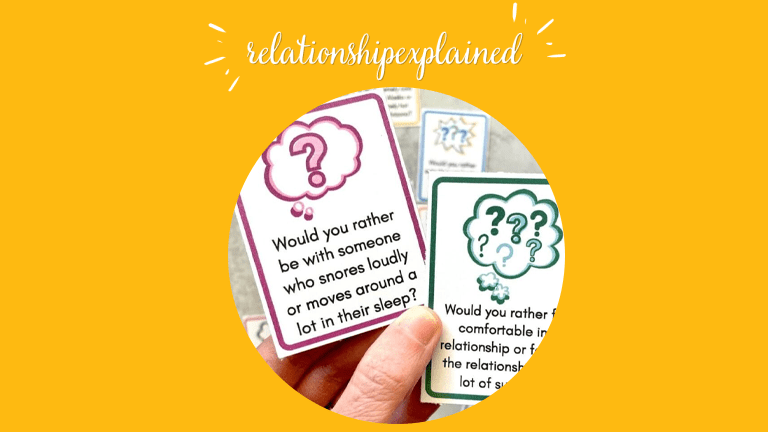Does Online Dating Count As A Relationship?
Online dating is not always a relationship due to factors like limited non-verbal communication, fewer shared experiences, and perceived disposability. However, sometimes it can lead to a real relationship, such as when there is consistent communication, shared timing, mutual comfort with vulnerability, and seamless connections.
Welcome to the realm where love meets technology!
In today's exploration, we delve into a burning question: "Does online dating count as a relationship?" Join us as we navigate the world of virtual connections, decoding the intricacies of swiping, messaging, and forging digital bonds. This guide aims to provide clarity and help you determine whether online dating truly qualifies as a relationship.
Get ready for insightful perspectives, thoughtful analysis, and practical insights that will shed light on this fascinating topic. Let's embark on this enlightening journey together and discover the truth behind the phenomenon of online dating and its potential for meaningful connections.
Reasons Why Online Dating Usually Does Not Count As A Relationship
1. Lack Of Physical Presence
One significant drawback of online dating is the lack of physical presence, which sets it apart from traditional couples who have the advantage of being physically together. Physical touch and proximity play crucial roles in fostering a deeper emotional connection and intimacy that online relationships often struggle to replicate.
The absence of shared physical experiences, such as holding hands, hugging, or even simple moments of physical comfort, can create a void that cannot be filled through virtual means alone.
2. Limited Non-Verbal Communication
One notable drawback of online relationships is the limited non-verbal communication available between people who meet online and spend time together virtually. Non-verbal cues, such as facial expressions, body language, and tone of voice, are essential in conveying emotions and understanding the true meaning behind words.
These subtle signals provide valuable context and depth to conversations, fostering a deeper level of connection. In online dating, relying solely on written messages or video chats can create challenges in accurately interpreting and conveying emotions, leading to potential misunderstandings or miscommunication.
3. Deception And Misrepresentation
One concerning aspect of online relationships is the prevalence of deception and misrepresentation that can occur when interacting with someone online. In the digital realm, it becomes easier for individuals to create false identities, manipulate information, or present themselves in a misleading way.
This can lead to a lack of trust and authenticity in the relationship. Without face-to-face interactions and deeper knowledge of a person's character, it becomes more challenging to discern genuine intentions from deception.
4. Superficial Judgements
The tendency for superficial judgments is extremely high in an online relationship. Such judgments are based on limited information and profiles. In the online realm, individuals often make quick decisions about potential partners based on superficial attributes, such as appearance or a brief bio.
This emphasis on initial impressions can overshadow deeper qualities and compatibility factors that are crucial for a successful and meaningful relationship. Rushing to judgments based on limited information can result in missed connections or premature dismissals.
5. Limited Shared Experiences
One limitation of online relationships is the lack of opportunities for shared experiences that are commonly found in real relationships. While people online can connect intellectually and emotionally, the absence of physical togetherness restricts the range of shared activities and moments.
In an online relationship, the scope for such shared experiences is limited to virtual interactions, which may not provide the same depth of connection as real-life experiences. This can result in a less well-rounded and immersive relationship overall.
6. Difficulty In Conflict Resolution
Navigating conflict resolution can be challenging in online relationships, particularly due to factors such as distance, time zones, and limited in-person communication. Resolving conflicts effectively often requires immediate, face-to-face interaction, which is not always possible in an online setting. Misunderstandings can arise due to the absence of non-verbal cues and the delay in response times, leading to increased tension and frustration.
Additionally, online partners may lack the support of mutual friends or a shared physical environment that can facilitate conflict resolution. Resolving conflicts in an online relationship requires patience, effective communication skills, and a willingness to work through challenges despite the limitations imposed by the virtual nature of the connection.
7. Dependency On Technology
One significant drawback of internet relationships is the inherent dependency on technology. The reliance on digital platforms and constant connectivity can create both practical and emotional challenges. Partners in an Internet relationship heavily rely on technology for communication and interaction.
Technical glitches, connectivity issues, or even temporary disruptions can disrupt the flow of conversation and hinder meaningful connections. Furthermore, the reliance on virtual platforms can lead to a sense of detachment from the real world as the relationship becomes intertwined with the digital realm.
8. Difficulty In Assessing Chemistry
One of the challenges in internet relationships is the difficulty in accurately assessing chemistry between partners. While talking and engaging in conversations online can provide insights into shared interests and compatibility, it can be challenging to gauge the chemistry that is vital for a romantic connection. The absence of physical presence and non-verbal cues can make it harder to sense the subtle sparks of attraction and connection that often occur in face-to-face interactions.
Although partners may talk extensively and form emotional bonds, the true chemistry and magnetic pull between individuals may only be fully understood through in-person encounters. The lack of this immediate physical connection can add a layer of uncertainty and make it challenging to determine the depth of chemistry between partners.
9. Limited Social Integration
In online relationships, there can be a limitation in terms of social integration compared to traditional relationships. While individuals may deeply connect with their online partners, they often miss out on the opportunity to seamlessly integrate them into their social circles. Deciding to share their feelings about their relationship with family and friends can be a complex decision.
Most people may find it challenging to fully understand and validate the connection that has developed solely online. This limited social integration can create a sense of isolation or the feeling of keeping a significant part of one's life separate from their wider social network. And this can impact the overall dynamics and support system of the relationship.
10. Perceived Disposable Nature
One perception surrounding online dating is the notion of a perceived disposable nature in relationships. Given the abundance of potential matches and the ease of swiping or clicking through profiles, individuals may develop the idea that relationships formed online are easily replaceable.
This mindset can influence decision-making and commitment levels, as some may believe that they can always find someone new with a simple swipe on their phone. This perceived disability can lead to a lack of investment and effort in cultivating and maintaining a meaningful connection.
Signs Online Dating Could Lead To A Relationship
1. Consistent Communication
Consistent communication in online relationships is a powerful sign that the connection is evolving into a real-life relationship. When both individuals engage in frequent and reliable interactions, it demonstrates a genuine interest and commitment to getting to know each other beyond the digital realm.
Unlike the stop-and-go nature often seen in online dating, this consistent communication suggests a level of exclusivity and focus on one another. This steady and meaningful exchange of messages paves the way for a deeper emotional bond and sets the stage for a potential transition into real-life interactions.
2. Shared Timing
In an online relationship, shared timing reveals a remarkable alignment of emotions and intentions. When both partners naturally reach a point where they want to progress and meet in person, it highlights a deep connection and mutual readiness for something more.
This synchronous desire to take the next step speaks to the potential of a meaningful offline relationship. It emphasizes that online relationships work when both individuals are genuinely invested in each other, and at that moment, the only person who matters is the one they've found online. This shared timing becomes a significant stepping stone toward building a genuine and lasting connection in real life.
3. Meaningful Emails
Meaningful emails play a vital role in internet relationships in fostering a genuine connection. When both individuals eagerly share the minutiae of their lives and find joy in reading each other's emails, it reflects a deep level of interest and emotional investment. Expressing excitement about everyday occurrences showcases a unique bond, where both partners enrich each other's lives through their perspectives and humor.
4. Similar Approach To Relationships
A similar approach to romantic relationships indicates profound compatibility in an internet relationship. When both partners agree on the importance of spending time alone after ending a serious relationship, it reflects their individual contentment and independence. This alignment showcases a mature perspective on personal growth before pursuing new connections.
It suggests that they both seek fulfilling lives on their own and are not driven by a constant need for a relationship to fill a void. This shared viewpoint lays the groundwork for a potentially healthy and balanced offline relationship, where they prioritize each other as the only person in their journey.
5. Comfort With Vulnerability
Comfort with vulnerability in real relationships is crucial, even in the early stages of online interactions. When both individuals can openly share their quirks and vulnerabilities without fear of judgment, it fosters a deep sense of trust and emotional connection. This ability to be authentic and accepted sets the stage for a strong and committed relationship. Both partners embrace each other's true selves and build a genuine bond based on honesty and acceptance.
6. Common Definition Of Partner
In the context of online daters, having a common definition of a partner is vital. When both individuals share a similar vision of what a romantic partner means to them, it aligns with their expectations and goals. Such understanding extends to long-distance relationships, as they mutually agree on the role a partner should play in their lives.
This compatibility in defining a partner fosters a deeper connection, increasing the potential for a successful and fulfilling long-term relationship.
7. Equal Selectivity
Equal selectivity is a positive sign in dating online, indicating a shared approach to forming connections. When both individuals have met a similar number of people from online dating profiles, it suggests that they are equally cautious and discerning about their potential matches. This mutual discernment extends to offline relationships, signifying compatibility in judgment and the likelihood of making well-informed decisions about their connection's direction.
8. Acceptance Of Flaws
Acceptance of flaws in online dating profiles is a crucial factor in building committed relationships. When both romantic partners can openly share their imperfections without judgment, it fosters a deep sense of comfort and trust.
This acceptance creates a safe space for vulnerability and authenticity, where they embrace each other's quirks and unique qualities. It paves the way for a genuine and lasting connection grounded in mutual understanding and unconditional love.
9. Joint Decision To Go Offline
A joint decision to go offline is a pivotal moment in internet relationships. When both individuals mutually agree to transition from instant messaging and video chat to real-life interactions, it signifies a strong desire to pursue a genuine relationship. This shared commitment demonstrates a genuine connection and readiness to take the relationship to the next level.
It helps bridge the gap between the digital world and opens up the prospect of building a meaningful and lasting real relationship.
Conclusion
In conclusion, the question of whether online dating counts as a relationship hinges on various aspects. While challenges like limited non-verbal communication and perceived disposability cast doubt, online dating's transformative potential cannot be ignored. The key lies in the depth of connections formed.
When individuals who met online build strong emotional bonds, prioritize communication, and establish mutual comfort, a genuine internet relationship emerges. These foundations pave the way for a long-lasting friendship and, in some cases, blossoming into a real, meaningful relationship.
How they met becomes inconsequential as the authenticity and emotional investment are what truly matter, making online dating a valid avenue for fostering deep connections.













